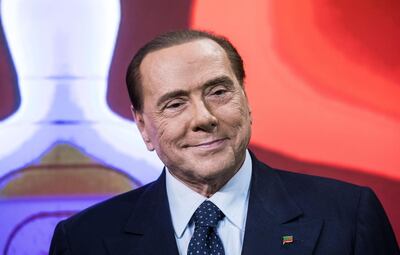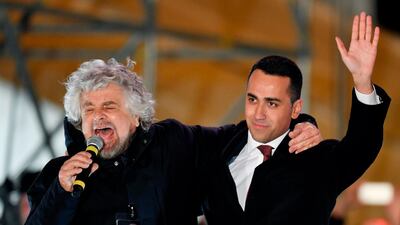As a rare snowfall covered most of Italy last week, a clean-cut and sharply dressed 31-year-old was out touring the country in a final bid to win hearts and minds.
That man was Luigi Di Maio and, if the latest opinion polls are to be believed, the maverick, populist 5-Star Movement that he leads is set win the most votes in Sunday’s general election.
Having spurned traditional alliances and coalitions, 5-Star may still not get a chance to govern. But its stellar rise is sparking fear among Italy’s "establishment" politicians, who have tried desperately to curtail its influence since it was set up nine years ago by stand-up comedian Beppe Grillo.
"I do not know if we will win," Demetrio Pusceddu, a 5-Star supporter from Milan, told The National. "But the idea is winning for my country."
In his closing rally on Friday, Mr Di Maio stuck closely to his tried-and-tested script, denouncing corruption and promising to give power back to the Italian people.
Speaking at the Piazza del Popolo in the centre of Rome, Mr Di Maio urged Italians to reject the policies of both the left and the right, and to vote for a new future.
“The centre left is over, the centre right is over,” he declared to a cheering crowd. “This is your chance to say no to the parties that have ruled the country for 20 years without changing anything.”
Mr Di Maio promised to halve MPs salaries and cut back on their pensions, as well as to slash €30 billion (Dh136bn) of “waste and privilege”. The cash, he said, would be redirected to families, to the poor, the unemployed and to retirees.
“No one will be left behind by the state,” he insisted. “We don’t want to hear broken promises anymore.” The crowd roared their support, with cries of “onesta” (honesty).
_______________
Read more:
Party's rise puts Berlusconi's mansion back in spotlight
La dolce vita lures global ultra-wealthy to Italy
_______________
If elected on Sunday, Mr Di Maio could become Italy’s youngest ever prime minister. For a university dropout with a patchy resume, his ascent has been as spectacular as that of the entire movement he leads.
The message about the corruption and ineffectiveness of the political class has been central to 5-Star’s appeal from the start.
Mr Grillo’s foul-mouthed rants against the ruling elites, voiced through blogs and high-profile comedy tours around the country, won the party an early following among liberal-minded Italians. His iconoclastic rallies, dubbed “V-Day” – with “V” standing for an Italian swear word – were a crude way of demonstrating what he and his followers felt about the policy offerings of the mainstream parties.
Under his leadership, 5-Star won an astonishing quarter of the vote in the February 2013 election. But the group has since sought to temper its anti-establishment image in order to widen its appeal, with the appointment of the suave, moderate Mr Di Maio last September the clearest representation of its change in direction.
Mr Grillo – a shaggy 69-year-old with an unkempt beard – has been seen less and less at campaign events, although he made a brief appearance alongside his boyish successor at Friday’s rally.
The party has also softened its Eurosceptic stance. While Mr Di Maio has repeatedly criticised European Union budget rules, he now says a referendum on abandoning the single currency would be a “last resort” after attempts to overhaul EU treaties.
But the party continues to attack corruption and cronyism and to denounce banker pay while demanding tax cuts for small businesses. It is a message that is proving popular in a nation fed up of austerity and resentful about years of stagnant economic growth.
"Politicians don't represent us, we're tired of their corruption," Romeo Caputo, a 5-Star supporter from Pescara, told The National. "They're doing their best to stop our party, but they can't. This is our time."
Another attendee at Friday’s rally, Emilio Rota from Campagna, said he had felt so disaffected by politics that he stopped voting altogether in 1996. It is only the 5-Star’s allure that has pulled him back.
“If you see the people in this piazza, they’re from totally different backgrounds,” he observed. “The 5-Star offers an alternative that appeals to many diverse groups. I’m 100 per cent convinced that we will be the biggest party in terms of votes on Sunday.”
The last opinion polls, taken before a blackout began two weeks ago, showed the election is likely to end with a hung parliament. 5-Star is currently top choice, with about 28 per cent of the vote, but that is not enough to rule on their own and they have repeatedly rejected the idea of striking deals with other parties.
A centre-right alliance built around four-time premier Silvio Berlusconi's Forza Italia looks likely to win the largest number of seats – potentially propelling the 81-year-old billionaire back to centre stage even though he is barred from becoming prime minister again due to a tax fraud conviction.

Another possibility is that Forza Italia and the centre-left Democratic Party, led by current prime minister Paolo Gentiloni, build a “grand coalition” after the election.
“They will join forces to try and keep us out of office,” Mr Caputo warned, voicing a typical 5-Star suspicion.
Ultimately, if a new government cannot be formed, fresh elections will be called.
Whatever happens, most analysts agree that 5-Star will remain a force to be reckoned with.
“The movement has gained a structural foothold in the Italian party system and will remain a key player in the country’s politics for the foreseeable future,” said Peter Ceretti, Italy analyst at the Economist Intelligence Unit.
In fact, staying out of power could be the best thing for an “anti-establishment” group such as the 5-Star.
"If they [5-Star] were to be in the government position, they will be tested in their ability to implement the radical changes they advocate," Filippo Taddei, professor of international finance at SAIS Johns Hopkins University, told The National. "It would take a strong and organised group of competent and experienced policymakers, something they simply lack."
“The irony is, the 5-Star Movement should actually be hoping it doesn’t get into government in this election,” he added. “Blaming the system rather than ruling it is the greatest chance it has of increasing its votes.”

